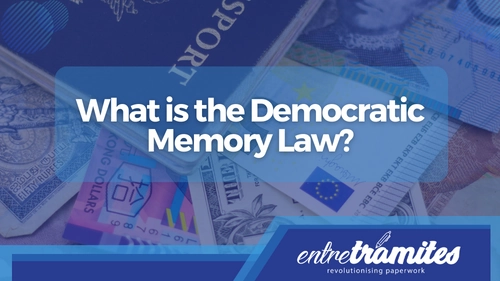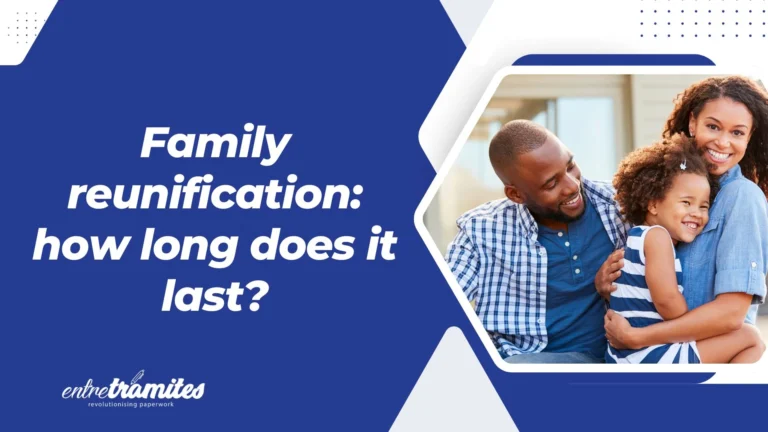The Democratic Memory Law takes as a reference the individual and collective struggles of the men and women of Spain for the conquest of their rights, freedom, and democracy. Spain has a long liberal and democratic tradition that emerged with the Cadiz Courts and the Constitution of 1812.
Being able to acquire Spanish citizenship through the Democratic Memory Law is already a fact. It can be processed and requested through the Civil Registries since last October 21st.
Although the aforementioned Law was published in the BOE (Official State Gazette) on October 20, 2020, we were all expecting the long-awaited instruction that said it should be published from the General Directorate for Legal Security and Public Faith, which detailed how to accredit, for example, the condition of exile.
How to acquire it? What are the requirements? In this post, we’ll tell you everything you need to know about the Democratic Memory Law so keep reading! And if you have any questions, you can contact Entre Trámites and we’ll answer them. You can manage your Spanish citizenship procedures with us. Schedule a free consultation!
What the BOE says about the Democratic Memory Law
Of this Democratic Memory Law, we highlight the following:
As a remedial measure to the people who suffered exile, it is written in the additional provision a rule for the acquisition of Spanish citizenship for those born outside Spain of parents or grandparents, exiled for political, ideological, or religious causes.
Likewise, consistent with the objectives of this Law, to the sons and daughters born abroad to Spanish women who lost their nationality by marrying foreigners, before the entry into force of the 1978 Constitution; as well as to the adult sons and daughters of those Spanish citizens whose nationality of origin was recognized by virtue of the right of option in accordance with the provisions of this Law or in the seventh additional provision of Law 52/2007, of December 26.
Spanish Citizenship to volunteers of the International Brigades
Article 33 of this Law, on the Granting of Spanish citizenship to the volunteer members of the International Brigades, states the following:
- For the purposes of article 21.1 of the Civil Code, it is understood that exceptional circumstances are met by the volunteer members of the International Brigades who participated in the War of 1936 to 1939 for the acquisition of Spanish citizenship by letter of naturalization, not being applicable to them the requirement of renunciation of their previous nationality required in Article 23.b) of the Civil Code. Likewise, it will be understood that the same circumstances are met by the descendants of the brigades’ members who prove a continuous work of dissemination of the memory of their ancestors and the defense of democracy in Spain.
- The requirements and the procedure to follow for the acquisition of Spanish citizenship by the people mentioned in the previous paragraph will be established by regulation.
Principles and objectives of the Law
One of the objectives of the Democratic Memory Law is to not repeat the “black” stages of Spanish history, thus introducing the crime of being an apologist for Francoism, establishing harsh penalties ranging from €200 to €150,000 to those who exalt the Civil War or the dictatorship.
In addition, it incorporates the possibility of closing foundations that incite hatred, glorify the dictatorship, or humiliate the victims, which could mean the extinction of foundations such as the Valley of the Fallen, although not immediately. A Prosecutor’s Office for the Democratic Memory Chamber will be created to investigate violations and honor the memory of the victims.
Carmen Calvo was the driving force behind this Law as vice-president and former head of the Ministry of the Presidency, Relations with the Courts and Democratic Memory. Since July 12th, the position was in the hands of her successor, Félix Bolaños.
Acquisition of Spanish citizenship
Those born outside Spain of parents or grandparents who had originally been Spanish, and who, as a result of having suffered exile due to political, ideological or religious reasons, sexual orientation or identity, had lost or renounced Spanish nationality, will be able to opt for it again under the effects of article 20 of the Civil Code.
The purpose of the Democratic Memory Law is to promote cohesion and solidarity between the generations around constitutional principles, values, and freedoms. It aims to recognize all those people who suffered persecution or violence, for political, ideological or religious reasons, sexual orientation or identity, during the period between the 1936 Coup d’état, the Civil War and the Franco Dictatorship until the promulgation of the Spanish Constitution in 1978.
Once approved the Democratic Memory Law, it will replace the Historical Memory Act of 2007 created by the Government of José Luis Rodríguez Zapatero, to conform to the recommendations of international organizations, as explained by the Government.
New conditions to opt for Spanish Citizenship
As an important novelty of the Democratic Memory Law that concerns the descendants of Spanish people, Spanish citizenship will be eligible through three new conditions:
- Those born outside Spain of a parent or grandparent, who had originally been Spanish, and who, as a result of having suffered exile for political, ideological or religious reasons, or due to their sexual orientation, had lost or renounced their Spanish nationality.
- The sons and daughters who were born abroad to Spanish women who lost their nationality by marrying foreigners before the entry into force of the 1978 Constitution.
- The sons and daughters of legal age of those Spanish citizens whose nationality of origin was recognized by virtue of the right of option in accordance with the provisions of this Law or in the seventh additional provision of Law 52/2007, of December 26.
Recognition to the victims
To honor the victims and those who suffered reprisals, as well as to appeal to their moral reparation, the text of the Democratic Memory Law proposes to declare October 31st as the “Day of Remembrance and Tribute to the Victims of the Military Coup, War and Dictatorship”; and May 8th as the “Day of Tribute to the Men and Women who suffered exile as a result of War and Dictatorship”.
In addition, the concept of victims is identified as those people who:
“Regardless of their nationality, has suffered, individually or collectively, physical, moral or psychological damage, property damage or substantial impairment of their fundamental rights as a result of actions or omissions that constitute a violation of human rights during the period covered from the Coup d’état of July 18, 1936, the subsequent War and the Dictatorship, including the elapsed time until the entry into force of the Spanish Constitution of 1978”.
It is also stated in the Democratic Memory Law that a national DNA bank will be created so that families can find out where the remains of their repressed relatives are, in addition to a documentation center in Salamanca. The Executive will also make an inventory of goods plundered by the Francoist regime and the Democratic Memory will be added as curricular content in the educational system.
Implementation
The Democratic Memory Law was published in the BOE on October 20th, 2022, and from October 21st, 2022 it is already in force, so is now valid to request Spanish citizenship through the Democratic Memory Law.
If you want to do any immigration procedure or if you want to submit your Application for Spanish Citizenship, in Entre Trámites we invite you to know our immigration services here.
Contact us! Through the contact form, you can leave your information so that we can call you. You can also schedule a free consultation with us or simply text our Whatsapp.





